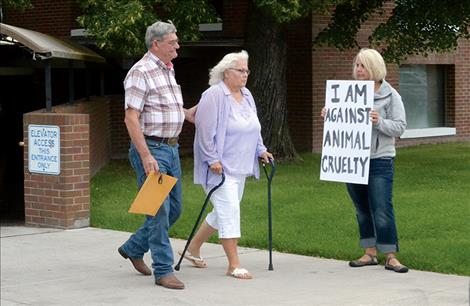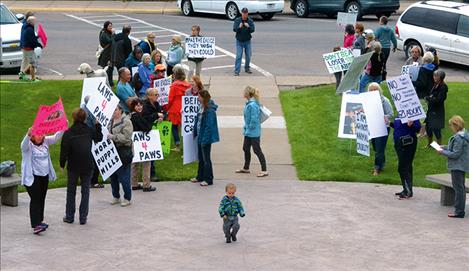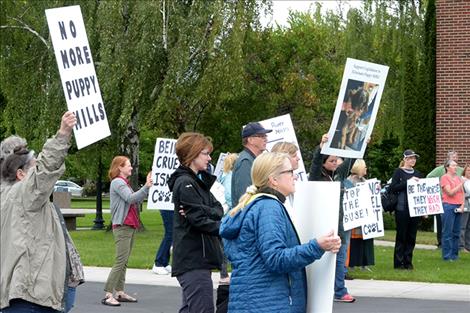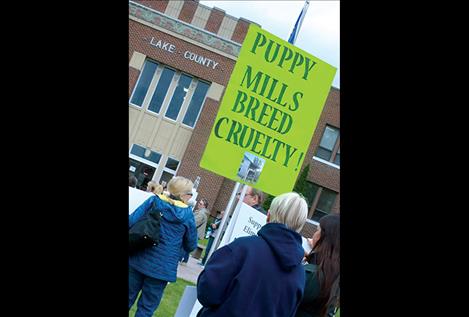Puppy mill owners appear in court amid demonstrators
Hey savvy news reader! Thanks for choosing local.
You are now reading
1 of 3 free articles.
POLSON — A couple, both charged with felony aggravated animal cruelty, made their first appearance in Lake County Justice Court Wednesday amid a throng of people demonstrating against puppy mills.
Larry August Latzke, 74, and Nadene Marie Latzke, 71, held hands and sat tersely awaiting Justice of the Peace Randal Owens as the small courtroom filled with demonstrators holding posters and talking among themselves.
Owens explained the charge against the two, which has a maximum punishment of two years in the Department of Corrections, $2,500 fine and possible restitution if applicable. They both requested attorneys be appointed. A trial date will be set for the couple to enter a plea in district court, which should be in about a month, according to Owens. Outside the courthouse more than 40 demonstrators waited for the couple to exit, shouting “no more puppy mills” and saying the couple should be ashamed of themselves.
According to court documents, on May 3 a woman called Lake County Sheriff’s Department to report a possible incidence of animal abuse or neglect. The woman had recently purchased a puppy from Larry Latzke at his St. Ignatius home on Dublin Gulch Road. She said the puppy was in very poor condition; its claws had not been trimmed, its fur was matted, and it did not know how to eat on its own. Research showed six other complaints dating back to 2008 had been filed regarding the animals at this property, known as LDR Kennels. A search warrant was applied for and granted.
On July 26, Lake County Sheriff’s Deputies executed the search warrant at the home of Latzke and his wife, Nadine. Larry asked to accompany the deputy during his search, but when Larry began to interfere with the search by cleaning up feces, he was told to return to the porch.
The deputy discovered a garage with multiple piles of feces and smelled “overwhelmingly like urine.” Outdoor kennels attached to the garage held numerous older dogs that had matted fur and smelled like feces and urine.
One of three shed-like structures was empty, but the other two had wire cages attached to the outside. Inside the cages were 96 small-breed dogs. Most had matted fur caked with feces and urine. All of the cages were covered in feces and urine. Many of the cages contained one to three dogs. The wire cages did not allow a solid surface for the dogs to stand on or a soft area to rest. Some of the dogs ran in circles constantly — a behavior pattern created by minimal outdoor exercise, according to court documents.
During the search, the deputy saw Larry drop a pill into one of the dog’s cages. The pill dropped into a catch pan full of feces and urine, and the deputy saw Larry retrieve the pill and feed it to the dog.
Some of the dogs' ankle hair was soaked and had a green tint to it. One building had a back room covered in “an inch or so” of green slime, court documents stated.
Nadine told the deputy she was in poor health, and could not take as much care of the dogs as normal, but that Larry had been keeping up with trimming the nails of two dogs per day. She said she provided food and water, and she treated the dogs with health concerns. She said she had 30 breeding dogs but would have to check her files to find the actual number of dogs. Larry became upset when asked about the number of dogs housed there, saying it was personal information, according to court documents.
The decision was made to only document and seize 11 dogs that appeared to need immediate medical attention. During the process, some of the dogs had difficulty walking on the ground.
The 11 dogs were sent to a local veterinarian. The veterinarian outlined the health issues of each dog. One Chihuahua was so dehydrated the vet said it would have died without medical intervention. One pregnant Pomeranian did not appear to have health issues. The others suffered from a variety of issues such as poor or no teeth, small sores on feet, a mammary gland tumor, missing fur and fur covered in feces and urine.
Another doctor that was at the scene during the search concluded that even if the cages the dogs were confined were meticulously cleaned to remove feces and urine, “their design, size, and current use does not provide adequate room and even the most minimum of comforts for dogs.”
Montana’s laws don’t restrict puppy mills nor outline care breeding dogs require. House Bills regarding puppy mill laws have been presented in the 2013 and 2015 legislative sessions, but have not passed for a number of reasons.
In 2013 House District 51 Representative Mary MacDonald introduced HB 439, the “Montana Commercial Pet Protection Act” to the Agricultural Committee. The bill would have ensured that commercial pets bred, sold or made available for adoption in Montana are healthy. The bill included inspections of dog breeding facilities and outlined standards of care for feeding and watering while collecting fees from breeders to offset inspections.
“The ag committee was very leery of the regulations,” MacDonald said. The bill failed. MacDonald reintroduced it again in 2015 as HB 608, this time in the Department of Labor and Industry oversight committee. Again, it failed.
“It got into the committee very late,” MacDonald said. “There wasn’t enough time to absorb this new concept. It’s a good bill, it really is.”
Representative Dan Salomon remembers the bill and understood what it was trying to do to protect animals, but “there were issues and questions that needed answers we didn’t have.”
Yet he supports the concept.
“I’d definitely like to see a bill like this have an opportunity to work better ... so these issues can be dealt with in a more expedient manner,” Salomon said, referring to the search warrant executed on the local puppy mill. “Right now, it isn’t perfect.”
Salomon said it is not uncommon for a bill to take a few sessions of revamping before it is passed.




















